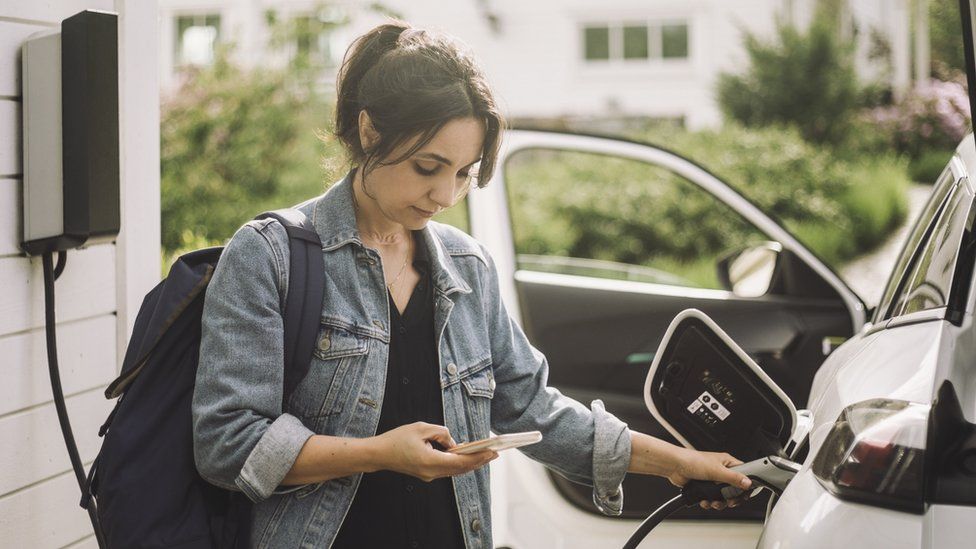ARTICLE AD BOX
 Image source, Getty Images
Image source, Getty Images
By Michael Race & Theo Leggett
BBC News
Car makers will still have to meet targets for selling electric cars next year despite the ban on sales of new petrol and diesel vehicles being delayed, motor industry sources say.
The zero emissions vehicle (ZEV) mandate is set to commence in January, and is expected to ensure at least 22% of cars sold by firms are electric.
If they fail to reach the quota, manufacturers will face heavy fines.
The government is expected to confirm the policy on Friday.
On Wednesday, Prime Minister Rishi Sunak confirmed the planned ban on sales of new, pure petrol and diesel vehicles was being pushed back five years from 2030 to 2035.
He said it was "not right to impose more costs on working people", adding "sensible green leadership" was needed.
Car manufacturers were split on the decision. Ford said the move undermined its electric car investment plans, but Toyota welcomed the announcement, saying the delay was "pragmatic".
But the BBC understands the motor industry has been told that a second ZEV policy, which will require that 22% of cars sold by each manufacturer have to be zero emission from 2024, is still set to be introduced.
One manufacturer said that having the zero emissions mandate still in force alongside pushing back the ban on new petrol and diesel car sales would make it harder for car makers to sell the electric cars they will be forced to do so.
If a car maker fails to hit the 22% electric vehicle sales target, it will either face fines of £15,000 per vehicle, or have to buy a surplus credit from a company that has sold lots of electric vehicles. However, a firm could claim back penalties if it surpasses the quota in a future way.
The quota on zero emission sales is expected to rise from 22% to reach 80% by 2030, but it is not known what the target will be after 2030, due to the ban on internal combustion engines being pushed back, meaning new ones could still be sold for a further five years.
What's the policy now?
Prior to Mr Sunak announcing a shift in policy, the government had planned to ban the sale of new, pure petrol and diesel vehicles by 2030. Now, it will begin in 2035.
By phasing out fossil fuel-powered vehicle sales, it aims to accelerate the transition to electric an achieve net zero by 2050. Net zero is when a country's net carbon emissions are cut to zero, and is seen as vital to tackling climate change.
Under the ban, from 2035 only electric battery-powered cars and certain hybrids will be able to be bought new. However, most people will not be affected by the ban immediately, as the majority of drivers buy vehicles second hand and only sales of new petrol and diesel models would be affected - not existing ones.
Motor industry analyst Philip Nothard, insight and strategy director at Cox Automotive, told the BBC the legislation obliging manufacturers to ensure at least a fifth of the cars it sells are zero emission models was "arguably a greater influence" on the market than delaying the ban on new internal combustion engine vehicles.
But he said "at least" Mr Sunak's move to push back the ban by five years meant the UK was aligned with the European Union.
"Of greater concern right now is the UK government's ambiguity and refusal to engage in any meaningful discussion about what it must do to encourage and accelerate the shift towards clean transportation," he said.
"The government must not lose sight of the now urgent requirements for significant investment in EV infrastructure and incentives to support private buyers with the transition to new and used electric vehicles. The automotive sector - and consumers - need clarity and certainty."
Mr Nothard added that because many carmakers were already committed to hybrid and electric-only ranges based on the government's previous 2030 policy, greener vehicles might be more attractive to buyers in terms of price because consumers would face a "limited choice" of new petrol and diesel cars, causing the prices of those vehicles to rise.

 1 year ago
37
1 year ago
37








 English (US) ·
English (US) ·